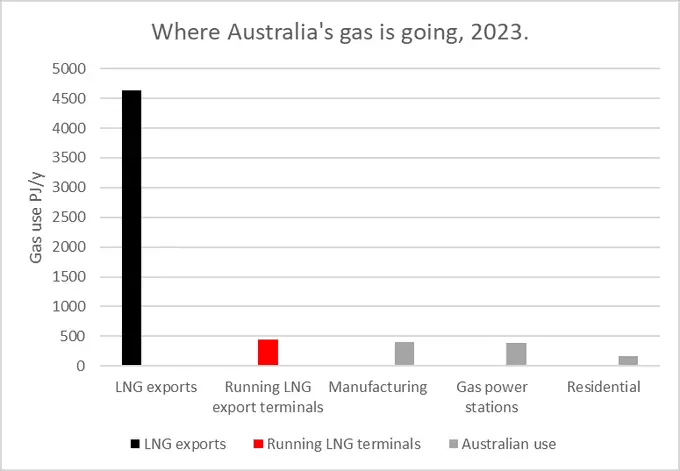Australia, one of the world’s largest gas exporters, finds itself in a paradoxical situation. Despite its substantial gas reserves and export capabilities, the country is facing the prospect of importing gas to meet domestic demand. This predicament raises questions about the nation’s energy policies and the priorities given to domestic consumption versus export revenues.
Foreign Ownership and Export-Driven Policies
The crux of the issue lies in the dominance of foreign-owned gas corporations operating in Australia. These companies have been granted permission to export a staggering 80% of the country’s gas production, leaving a mere 20% for domestic consumption. This export-driven approach, while generating substantial revenue for the corporations and contributing to Australia’s economy, has led to a potential supply shortfall for local consumers.
Balancing Act: Economic Gains vs. Self-Sufficiency
Apparently Australia, one of the worlds biggest gas exporters, is going start IMPORTING gas because we let foreign owned gas corporations export 80% of our gas and are too weak to keep a tiny bit more for ourselves.
— Mark Ogge (@MarkOgge) April 9, 2024
Who's running this country? https://t.co/CJ1EWv0UHs pic.twitter.com/6FPuOyvhoS
The Australian government finds itself caught between the conflicting goals of maximizing economic gains from gas exports and ensuring self-sufficiency in domestic energy supply. While the export revenue has been touted as a boon for the country’s economy, the unintended consequence is a potential gas shortage and the need to import gas to meet local demand.
Calls for Policy Reforms and Domestic Prioritization
Critics have raised concerns about the lack of foresight and the prioritization of export revenues over domestic energy security. There are growing calls for policy reforms that would mandate a higher percentage of gas production to be reserved for domestic consumption, thereby reducing the country’s reliance on imports.
Diversification and Transition to Renewable Energy
As the debate continues, some experts advocate for a diversification of Australia’s energy mix and a accelerated transition towards renewable energy sources. This approach could alleviate the country’s dependence on gas and mitigate the risks associated with volatile global energy markets.
Australia’s gas export dilemma underscores the delicate balance between economic interests and energy self-sufficiency. The nation must carefully evaluate its policies and priorities to ensure a sustainable and reliable energy supply for both domestic and export markets, while also considering the long-term implications of its energy choices.
